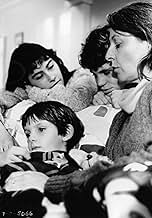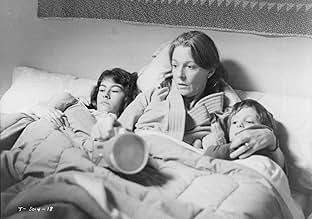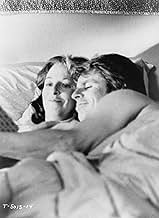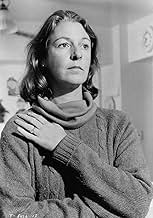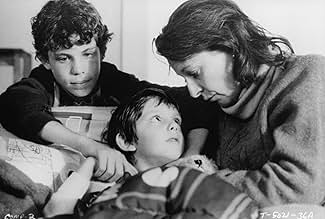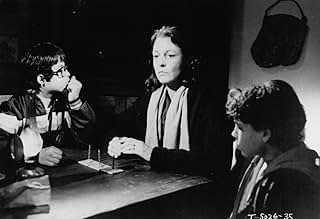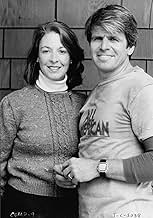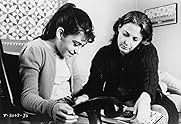IMDb RATING
6.9/10
7.6K
YOUR RATING
The life of a suburban American family is scarred after a nuclear attack.The life of a suburban American family is scarred after a nuclear attack.The life of a suburban American family is scarred after a nuclear attack.
- Director
- Writers
- Stars
- Nominated for 1 Oscar
- 2 wins & 6 nominations total
Rossie Harris
- Brad Wetherly
- (as Ross Harris)
William G. Schilling
- Pharmacist
- (as William Schilling)
- Director
- Writers
- All cast & crew
- Production, box office & more at IMDbPro
Featured reviews
I first saw "Testament" when it came out in 1983. At the time, I was 30 years old and the mother of a two year-old son. As a child of the Cold War years, I have always been interested in films about that most unthinkable event: the detonation of a nuclear bomb or bombs somewhere on our fragile planet. If you are, too, you must watch "Testament" (and another small gem of a slightly earlier era called "Fail-Safe.")
This is a wonderful film that slowly, unbearably reveals what happens in the small, idyllic town of Hamlin after a full-scale nuclear exchange between the superpowers wipes out a large part of America. The town and its citizens, including the Weatherly family, escape initial destruction. But slowly the bonds that hold western societies together (electricity, communication, fresh food, medical help) begin to fray and ravel. There is no television. Batteries to power transistor radios suddenly become more valuable than $20 bills in a town where, suddenly, there's nothing left to buy.
The story and scenes are permeated with a sense of enormous loss. A family loses its husband and father who simply walked out the door, waving a breezy goodbye one morning, and disappeared into the holocaust. All his wife, Carol, and two children have left of him are their memories and some flickering images on home movies, glimpses not just of a lost loved one, but of a lost -- and loved -- world.
A school play about the Pied Piper was in rehearsal before catastrophe hit, and, desperate to recapture some normalcy and to divert the children's attention from a reality to horrible to contemplate, the town decides to go on with the show.In the earlier rehearsal scenes, life was normal, the future shone brightly in the children's faces. Now, as the parents watch the performance, they see no future for these beautiful innocents. To me, this is the key scene of the film: the contrast between what these people once had and what has been lost is staggering. It makes you want to go outside, smell the air, marvel at the full supermarket shelves and the working telephone lines. (This is a gift that the movie gives its audience which goes far beyond entertainment and approaches enlightenment.)
Beyond the wonderful writing, direction and performances, I love the tiny touches in the story. For example, there's the foreshadowing, the implicit warning contained in the presence of a minor character, a little Japanese boy with Down Syndrome who is cared for by the town after his father dies. The child's name is Hiroshi. Pay attention, the script commands us in a whisper: Hiroshima happened once, but it can happen again, and it can happen to you as well as "them."
In the end, the movie is a testament to this undeniable fact, a testament to the stupidity of men who continue building ever-larger, more lethal means of mass destruction, and finally, a testament to the strength of mothers like the character of Carol Weatherly who have no choice but to love and protect their children no matter what comes.
This is a wonderful film that slowly, unbearably reveals what happens in the small, idyllic town of Hamlin after a full-scale nuclear exchange between the superpowers wipes out a large part of America. The town and its citizens, including the Weatherly family, escape initial destruction. But slowly the bonds that hold western societies together (electricity, communication, fresh food, medical help) begin to fray and ravel. There is no television. Batteries to power transistor radios suddenly become more valuable than $20 bills in a town where, suddenly, there's nothing left to buy.
The story and scenes are permeated with a sense of enormous loss. A family loses its husband and father who simply walked out the door, waving a breezy goodbye one morning, and disappeared into the holocaust. All his wife, Carol, and two children have left of him are their memories and some flickering images on home movies, glimpses not just of a lost loved one, but of a lost -- and loved -- world.
A school play about the Pied Piper was in rehearsal before catastrophe hit, and, desperate to recapture some normalcy and to divert the children's attention from a reality to horrible to contemplate, the town decides to go on with the show.In the earlier rehearsal scenes, life was normal, the future shone brightly in the children's faces. Now, as the parents watch the performance, they see no future for these beautiful innocents. To me, this is the key scene of the film: the contrast between what these people once had and what has been lost is staggering. It makes you want to go outside, smell the air, marvel at the full supermarket shelves and the working telephone lines. (This is a gift that the movie gives its audience which goes far beyond entertainment and approaches enlightenment.)
Beyond the wonderful writing, direction and performances, I love the tiny touches in the story. For example, there's the foreshadowing, the implicit warning contained in the presence of a minor character, a little Japanese boy with Down Syndrome who is cared for by the town after his father dies. The child's name is Hiroshi. Pay attention, the script commands us in a whisper: Hiroshima happened once, but it can happen again, and it can happen to you as well as "them."
In the end, the movie is a testament to this undeniable fact, a testament to the stupidity of men who continue building ever-larger, more lethal means of mass destruction, and finally, a testament to the strength of mothers like the character of Carol Weatherly who have no choice but to love and protect their children no matter what comes.
All of the comments i have read about this film focus on it's bleakness, on it's difficultly - due to subject matter, and many of them also quite rightly applaud the performance of Jane Alexander in the Central role. What none of them mention, and what seems so clear to me, is that this is a film that could only have been made by women.
There is no BIG EVENT here. No mass hysteria, violence, rape, disfigurement or any of those other factors that are paraded as horrifying in the majority of Nuclear War films - I am thinking specifically of Threads and The Day After Here.
In Testament we actually see humanity. We see how one family, one community copes with the devastation of just that - their family and their community.
This is what is so tragic, compelling and ultimately horrifying about this film. It is not a panache, it is not a broad canvas. It is about people not about issues and as such the humanity shines through.
I am not saying the other films aren't powerful in their way. They are - and both Threads and The Day After gave me nightmares. But Testament was so far beyond them in terms of simple courage and purpose. There was no grandiose, no glamour or tacked on love story. This was not hollywood, was life or the end of it, and all the more frightening for it.
Testament is one of the main reasons why we should see more women making politic films - and perhaps running a few more countries.
There is no BIG EVENT here. No mass hysteria, violence, rape, disfigurement or any of those other factors that are paraded as horrifying in the majority of Nuclear War films - I am thinking specifically of Threads and The Day After Here.
In Testament we actually see humanity. We see how one family, one community copes with the devastation of just that - their family and their community.
This is what is so tragic, compelling and ultimately horrifying about this film. It is not a panache, it is not a broad canvas. It is about people not about issues and as such the humanity shines through.
I am not saying the other films aren't powerful in their way. They are - and both Threads and The Day After gave me nightmares. But Testament was so far beyond them in terms of simple courage and purpose. There was no grandiose, no glamour or tacked on love story. This was not hollywood, was life or the end of it, and all the more frightening for it.
Testament is one of the main reasons why we should see more women making politic films - and perhaps running a few more countries.
It's been TWENTY YEARS (!) since I've seen this movie in a theatre, and I've never yet forgotten it. If any movie can be said to be life-changing, this is it. TESTAMENT was first shown in theatres, and the film's power became front page headlines for quite some time. People were crying in theatres, and article after article told of how this extremely powerful film affected people. This was not hype; the emotional strength of this movie is genuinely powerful.
For myself, I held back as best I could from crying in the theatre (me being a 23 year old guy seeing it with two (married) friends). But the effect on me was apparently visible immediately: when I walked out of the theatre and passed thru the line of people waiting for the next showing, a woman, who was laughing with her friends, happened to look at me and her face went completely serious. I very nearly hugged her right there, this stranger. When I got home, I cried for about two hours. The film's themes affected my, at the time, concerns about love, relationships, and such like.
One scene I'll never EVER forget, the most devastating: the 13-ish year old daughter asks her mother, "What's it like?" MOTHER: "What's what like?" DAUGHTER: "Making love." The mother (Jane Alexander -- my God, what a performance!) tells her in a very frank and beautiful speech, and the daughter caps off that scene with a devastating remark that just kills you and got my tears flowing (I probably couldn't hold back at that point).
Before making TESTAMENT, director Lynne Littman had made only documentaries, so maybe that "realism" style added to the power and believability of this movie. One of my all time favorite supporting actors is in this film, and he does a fantastic job: Mako. He and the young retarded (Down Syndrome?) boy who plays his son make a phenomenal team. They're my favorite characters: so full of innocence, father so full of love, strength and pain. Agh... my god my god... what a movie. Whew.
For myself, I held back as best I could from crying in the theatre (me being a 23 year old guy seeing it with two (married) friends). But the effect on me was apparently visible immediately: when I walked out of the theatre and passed thru the line of people waiting for the next showing, a woman, who was laughing with her friends, happened to look at me and her face went completely serious. I very nearly hugged her right there, this stranger. When I got home, I cried for about two hours. The film's themes affected my, at the time, concerns about love, relationships, and such like.
One scene I'll never EVER forget, the most devastating: the 13-ish year old daughter asks her mother, "What's it like?" MOTHER: "What's what like?" DAUGHTER: "Making love." The mother (Jane Alexander -- my God, what a performance!) tells her in a very frank and beautiful speech, and the daughter caps off that scene with a devastating remark that just kills you and got my tears flowing (I probably couldn't hold back at that point).
Before making TESTAMENT, director Lynne Littman had made only documentaries, so maybe that "realism" style added to the power and believability of this movie. One of my all time favorite supporting actors is in this film, and he does a fantastic job: Mako. He and the young retarded (Down Syndrome?) boy who plays his son make a phenomenal team. They're my favorite characters: so full of innocence, father so full of love, strength and pain. Agh... my god my god... what a movie. Whew.
Testament (1983) was one of the few films that came out during the 80's that dealt with the Nuclear War scenario seriously. Jane Alexander stars as the matriarch of your typical middle class family. One day when the father (Bill Devane) is on a business trip, life as we know it was ended when the missiles were launched. Who or what caused this holocaust was never explained. But the only that thing that matters now is survival and trying to keep the family together. What tragic world lies ahead for the family now that life as they knew it was changed forever?
A real heartbreaking film that shows the side of the human condition that we all have deep within us. There's no big budgeted effects or over the top acting in this film. Just raw emotion, great acting and a real good script and direction that fuels this drama. I strongly recommend this movie for all the reasons I have stated.
A real heartbreaking film that shows the side of the human condition that we all have deep within us. There's no big budgeted effects or over the top acting in this film. Just raw emotion, great acting and a real good script and direction that fuels this drama. I strongly recommend this movie for all the reasons I have stated.
Forget Freddie and Jason, if you want a real horror film then I recommend this because I think it will keep most normal people awake long into the night. This film doesn't rely on gore or violence to get its message across; instead it takes the very familiar scene of a loving young family living in a close-knit town and dumps them into the harsh, harrowing realities of nuclear war where there is no mercy for either the good or the innocent.
'Testament' is a tale of what would happen if a nuclear strike devastated America and how average people, who have no military training or the like, would cope. There is no computer virus to fix things nor is there some hunky, muscular hero to save the day; people are left to fend for themselves in a world forever changed, in conditions that are unforgiving and demoralising. The film revolves mainly around the Wetherly family, made up by parents- Carol and Tom - and their three children, fourteen-year-old Mary Liz, twelve-year-old Brad and six-year-old Scottie and it packs no punches for the fate of this little group.
For a film that couldn't have had a massive budget, not only is the script of good quality but so was the acting. Jane Alexander was excellent as a Carol, a mother striving to see her family through this disaster, watching as the town around her dwindles as people die of radiation poisoning or flee for safer pastors. But Ross Harris definitely deserves recognition for his part as young Brad. Through him, we are able to see how a child would deal with such an event and how the innocence of childhood is brought to a sharp end as Brad is forced to take the role of an adult for the sake of his family.
After seeing 'Testament', I don't think I'll ever really stop pondering the issues it raised and how it is vitally important that the governments of all countries do anything and everything to ensure we never have to deal with such an event in real life. It is very thought-provoking and terrifying in a way no horror flick can be. And if you want to add to your trauma, I recommend checking out 'Threads' (the same situation only set in England and so chilling that it makes this film out to be a bag of laughs) and 'The Day After'.
'Testament' is a tale of what would happen if a nuclear strike devastated America and how average people, who have no military training or the like, would cope. There is no computer virus to fix things nor is there some hunky, muscular hero to save the day; people are left to fend for themselves in a world forever changed, in conditions that are unforgiving and demoralising. The film revolves mainly around the Wetherly family, made up by parents- Carol and Tom - and their three children, fourteen-year-old Mary Liz, twelve-year-old Brad and six-year-old Scottie and it packs no punches for the fate of this little group.
For a film that couldn't have had a massive budget, not only is the script of good quality but so was the acting. Jane Alexander was excellent as a Carol, a mother striving to see her family through this disaster, watching as the town around her dwindles as people die of radiation poisoning or flee for safer pastors. But Ross Harris definitely deserves recognition for his part as young Brad. Through him, we are able to see how a child would deal with such an event and how the innocence of childhood is brought to a sharp end as Brad is forced to take the role of an adult for the sake of his family.
After seeing 'Testament', I don't think I'll ever really stop pondering the issues it raised and how it is vitally important that the governments of all countries do anything and everything to ensure we never have to deal with such an event in real life. It is very thought-provoking and terrifying in a way no horror flick can be. And if you want to add to your trauma, I recommend checking out 'Threads' (the same situation only set in England and so chilling that it makes this film out to be a bag of laughs) and 'The Day After'.
Did you know
- TriviaThe film was originally shot as a made-for-TV movie. Paramount executives were so impressed with it that they released it in theaters as a feature. The cast sued the producers for higher pay, claiming they were paid television salaries and not feature film salaries. The case was settled out of court.
- Quotes
Mary Liz Wetherly: [Remember] the morning I walked in on you and Dad?
Carol Wetherly: Yes.
Mary Liz Wetherly: What's it like?
Carol Wetherly: What's what like?
Mary Liz Wetherly: Making love. Don't play mother with me.
Carol Wetherly: That's what I am.
- SoundtracksAll My Loving
(1963)
By John Lennon and Paul McCartney
Produced by Andrew Dorfman
Performed by Mitch Weissman
Courtesy of Mac Len Music
Details
Box office
- Gross US & Canada
- $2,044,892
- Opening weekend US & Canada
- $317,996
- Nov 6, 1983
- Gross worldwide
- $2,044,892
Contribute to this page
Suggest an edit or add missing content




